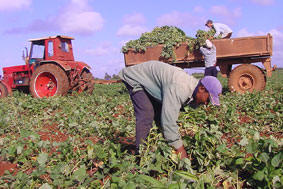Howard Lake farmer explores Cuban agriculture
- Submitted by: admin
- international
- Society
- United States
- Business and Economy
- Personalities
- 03 / 29 / 2010

Through the Minnesota Agriculture and Rural Leadership (MARL) Program, Marquardt was able to spend nine days exploring food distribution, agricultural production, and economic complexities in the Caribbean Island country.
“That was my first time in Cuba,” Marquardt said. “It was very neat.”
In Cuba, there has been a trade embargo in place since the Cuban revolution in 1959. According to a press release from MARL, doing business in Cuba requires an understanding of the intricacies of conducting commerce between countries that don’t officially have relations.
“I learned that the people of Cuba do not hate America,” Marquardt said. “They would love for the embargo to end. Thus, they were very friendly to us.”
Before entering Cuba, Marquardt and his fellow participants spent two days in Miami, FL to learn about agricultural industries comparable to those in Cuba. Stops included a sugar cane operation, lettuce farm, and a presentation at the Everglades Research and Education Center of the University of Florida.
While in Florida, the group also met with Cuban immigrants, including Tony Oliva of the Minnesota Twins.
“Our time in Florida was a great primer for the Cuba agriculture we saw,” noted Tim Alcorn, MARL executive director. “We left Cuba with a far better feel for the economic issues facing the communist country.”
Technology gap
“Most of the agriculture [in Cuba] is done with equipment made in the 1950s,” Marquardt said. “A lot of people still use oxen or do the work by hand. They are way behind on technology.”
According to Marquardt, the current state of US and Cuban relations impacted the trip.
“It was like time stood still from about the 1950s,” he said, explaining that in some areas, if a photo were taken of the city 50 years ago and the same photo were taken today, it’d be hard to tell the difference.
During the trip, Marquardt saw the home of one of Cuba’s doctors.
“It was about half the size of a normal rambler,” Marquardt said. “It also had a backyard, which was unusual. He was probably one of the most affluent people in the area.”
The doctor’s family considered themselves fortunate to own a 1953 Buick.
“They were pretty excited, because not very many people own a car there,” Marquardt said.
Ending the embargo
There is huge potential for market growth in Cuba, according to MARL.
“The Cuban market holds good potential for tourism, which translates into demand for higher quality foods, particularly dairy and meat products that Minnesota could provide in the future,” the press release stated.
However, the route US products must take to get to Cuba under the current embargo makes them unaffordable for many Cubans.
“There’s a lot of red tape, and it slows down the whole process,” Marquardt said.
Minnesota Congressman Collin Peterson, chairman of the US House Agriculture Committee, is preparing legislation to make the sale of agricultural products to Cuba easier.
“He’s trying to open up some of those restrictions,” Marquardt said.
The bill also aims to ease the tight travel restrictions that prevent most US citizens from being allowed to travel to Cuba.
Marquardt said he would enjoy going back to Cuba someday, once the embargo ends.
“It’d be interesting to see what changes are made,” he said. “There is a lot of good ground for farming. It would be fun to see how it would look if they were to use more modern equipment.”
About the MARL class
Marquardt was part of the fifth MARL class to complete an international trip, marking the end of the two-year leadership class.
“It was tough to get into,” said Marquardt, who first applied in 2006.
Class members pay a participation fee, but most of the funding is from private sector associations, organizations, businesses, corporations, foundations, and individuals.
Two-thirds of the participants are agricultural producers, and the other third is comprised of agribusiness people and other types of rural leaders.
Marquardt farms about 1,000 acres of cropland with his father, and also sells hay and hauls manure for local horse farmers.
He enjoys being active in the community, and is the FFA alumni president at HLWW, an AgStar Financial Services Young Beginning Farmer committee member, and the chairman of the development and marketing committee at Holy Trinity.
Marquardt and his wife, Julie, have a 10-month-old son named Adam.
The MARL class that Marquardt was involved in included seminars that started in November 2008. The group also took a five-day national study tour to Washington, DC.
Marquardt said the class was an interesting way to learn more about cities in Minnesota as well as foreign agriculture.
The purpose of the MARL program is to help rural leaders maximize their impact in local, state, national, and international arenas.
Applications for the next MARL class are being accepted until Wednesday, March 31. More information is available on the MARL
web site, at www.MARLprogram.org.
By Starrla Cray
Staff Writer
Source: www.herald-journal.com
Comments